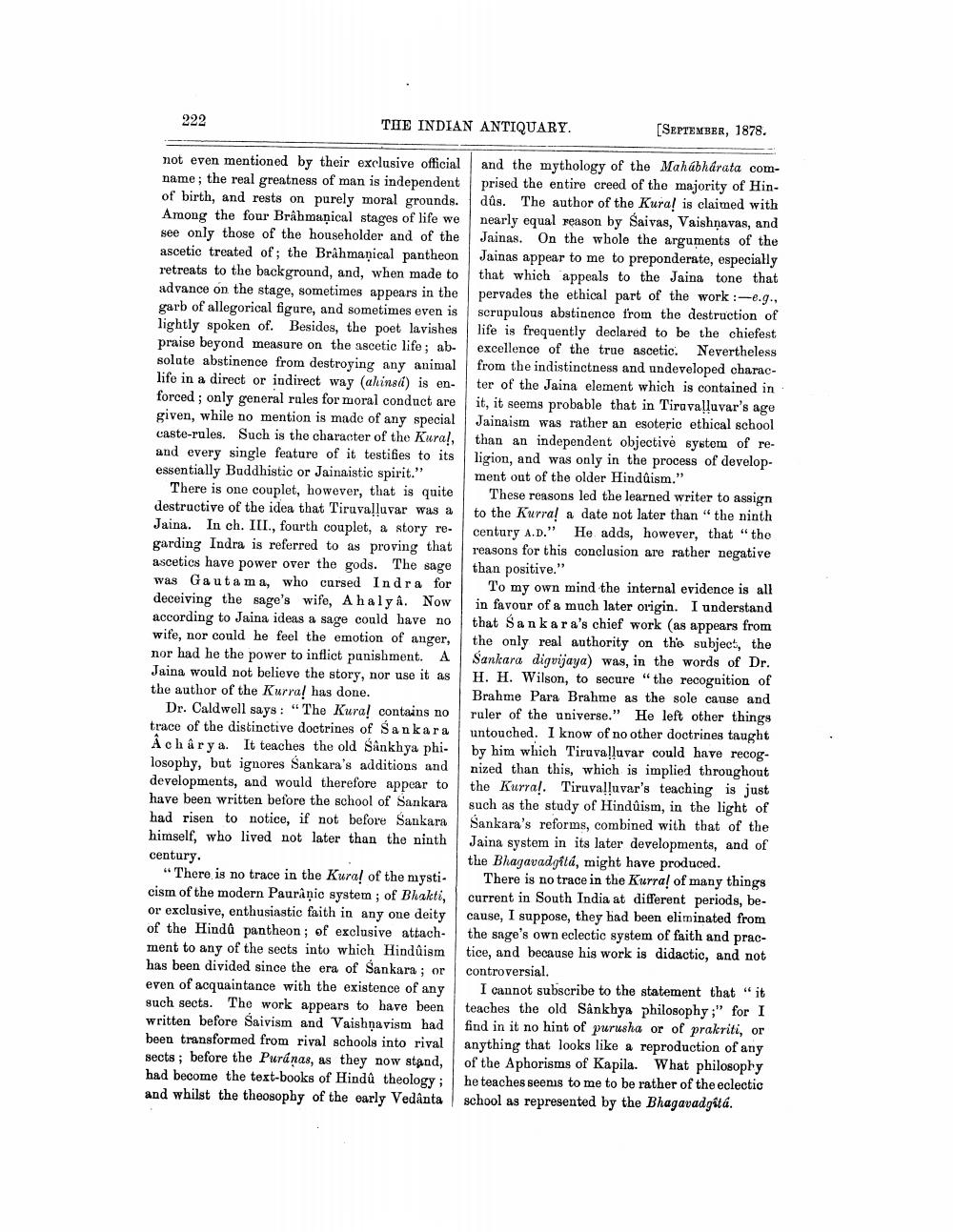________________
222
THE INDIAN ANTIQUARY.
[SEPTEMBER, 1878.
not even mentioned by their exclusive official and the mythology of the Mahabharata comname; the real greatness of man is independent prised the entire creed of the majority of Hinof birth, and rests on purely moral grounds. dûs. The author of the Kura! is claimed with Among the four Brâhmanical stages of life we nearly equal reason by Saivas, Vaishnavas, and see only those of the householder and of the Jainas. On the whole the arguments of the ascetic treated of; the Brahmanical pantheon Jainas appear to me to preponderate, especially retreats to the background, and, when made to that which appeals to the Jaina tone that advance on the stage, sometimes appears in the pervades the ethical part of the work :-e... garb of allegorical figure, and sometimes even is scrupulous abstinence from the destruction of lightly spoken of. Besides, the poet lavishes life is frequently declared to be the chiefest praise beyond measure on the ascetic life; ab- excellence of the true ascetic. Nevertheless solate abstinence from destroying any animal from the indistinctness and undeveloped characlife in a direct or indirect way (ahinsli) is en t er of the Jaina element which is contained in forced ; only general rules for moral conduct are it, it seems probable that in Tiravalluvar's age given, while no mention is made of any special | Jainaism was rather an esoteric ethical school caste-rules. Such is the character of the Kura!, than an independent objective system of reand every single feature of it testifies to its ligion, and was only in the process of developessentially Buddhistic or Jainaistic spirit."
ment out of the older Hinduism." There is one couplet, however, that is quite These reasons led the learned writer to assign destructive of the idea that Tiruvalluvar was a to the Kurra! a date not later than " the ninth Jaina. In ch. III., fourth couplet, a story re- century A.D." He adds, however, that "the garding Indra is referred to as proving that reasons for this conclusion are rather negative ascetics have power over the gods. The sage than positive." was Gautama, who cursed Indra for To my own mind the internal evidence is all deceiving the sage's wife, A haly â. Now in favour of a much later origin. I understand according to Jaina ideas a sage could have no that Sankara's chief work as appears from wife, nor could he feel the emotion of anger, the only real authority on the subject, the nor had he the power to inflict punishment. A Sankara digvijaya) was, in the words of Dr. Jaina would not believe the story, nor use it as H. H. Wilson, to secure "the recoguition of the author of the Kurra! has done.
Brahme Para Brahme as the sole cause and Dr. Caldwell says: "The Kura! contains no ruler of the universe." He left other things trace of the distinctive doctrines of Sankara untouched. I know of no other doctrines taught Acharya. It teaches the old Sankhya phi- by him which Tiruvalluvar could have recoglosophy, but ignores Sankara's additions and nized than this, which is implied throughout developments, and would therefore appear to the Kurra!. Tiruvalluvar's teaching is just have been written before the school of Sankara such as the study of Hinduism, in the light of had risen to notice, if not before Sankara Sankara's reforms, combined with that of the himself, who lived not later than the ninth Jaina system in its later developments, and of century.
the Bhagavadgitá, might have produced. "There is no trace in the Kura! of the mysti. There is no trace in the Kurra! of many things cism of the modern Paurânic system ; of Bhakti, current in South India at different periods, beor exclusive, enthusiastic faith in any one deity cause, I suppose, they had been eliminated from of the Hindû pantheon ; of exclusive attach- the snge's own eclectic system of faith and pracment to any of the sects into which Hinduism tice, and because his work is didactic, and not has been divided since the era of Sankara ; or controversial. even of acquaintance with the existence of any I cannot subscribe to the statement that "it such sects. The work appears to have been teaches the old Sånkhya philosophy;" for I written before Saivism and Vaishnavism had find in it no hint of purusha or of prakriti, or been transformed from rival schools into rival anything that looks like a reproduction of any sects; before the Puranas, as they now stand, of the Aphorisms of Kapila. What philosophy had become the text-books of Hindú theology; he teaches seems to me to be rather of the eclectic and whilst the theosophy of the early Vedanta school as represented by the Bhagavadgitá.




